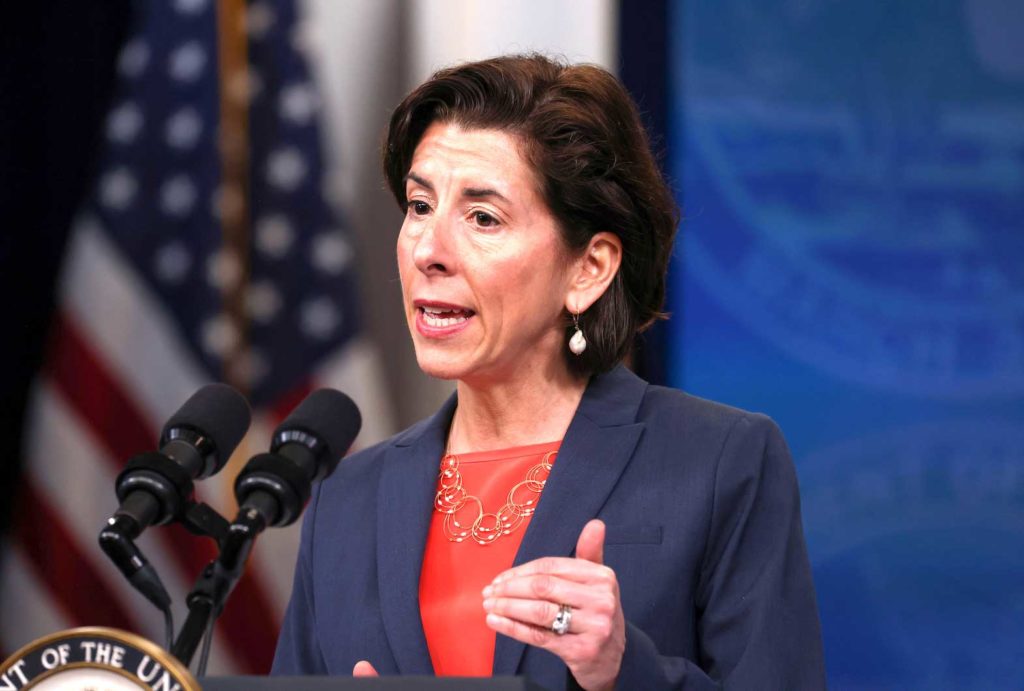Aging population to hit U.S. economy like a ‘ton of bricks’

U.S. Secretary of Commerce Gina Raimondo speaks during a high speed internet event at the Eisenhower Executive Office Building’s South Court Auditorium at the White House in Washington, U.S., June 3, 2021.REUTERS/Evelyn Hockstein
WASHINGTON – President Joe Biden does not yet have enough support from fellow Democrats to secure $400 billion in spending for at-home care for the elderly and disabled that the economy desperately needs, Commerce Secretary Gina Raimondo told Reuters on Monday.
Raimondo, who is paying for round-the-clock care for her own 90-year-old mother, said America’s aging demographics were going to hit the country “like a ton of bricks” without increased federal aid, and warned the current situation was “untenable.”
Failure to act, she said in an interview, would harm the U.S. economy by making it difficult for women – who fell out of the workforce by the millions during the COVID-19 pandemic – often to look after out-of-school children or parents – to return to work or remain in the workforce.
As post-World War Two baby boomers become senior citizens, there is a dangerous deficit of caregivers looming, Biden officials and many experts on aging say.
Currently, 16.5% of the U.S. population of 328 million people, or 54 million, are over the age of 65, the latest census shows. By 2030, that number will rise to 74 million. The number of people over the age of 85, who generally need the most care, is growing even faster.
Biden in March proposed boosting Medicaid, the federal medical program for lower-income Americans, by $400 billion over a decade to fund at-home care for elderly and disabled people, and increasing wages for caregivers. He remains committed to that $400 billion figure, Raimondo said.
She said details of the pending reconciliation bill – a Democrats-only budget measure that will include parts of Biden’s spending plans not included in a pared-down bipartisan infrastructure bill – were still being worked out.
But not all Democrats are on board for the increased care spending, she said.
“It will be a battle to get enough of it funded in the reconciliation package. We still have to make the case for it … and that’s part of the reason why I’m pounding the drum.”
Democrats hold a slim majority in the House of Representatives, while the Senate is split 50-50. That means all Senate Democrats must be on board to pass a budget measure with the tie-breaking vote of Vice President Kamala Harris.
Raimondo said she is continuing to meet with skeptics, including moderate Democratic Senator Joe Manchin. “It’s not so much that people are opposed, but $400 billion is a lot of money, and they have questions that deserve good answers.”
‘IT IS A CRISIS’
She said the pandemic had raised awareness about the lack of affordable care for children, the elderly and disabled, and even some Republicans – who opposed adding such spending to the infrastructure package – saw the need for change.
Raimondo said 1.5 million women still had not returned to the workforce after exiting during the pandemic to care for children whose schools had closed, and elderly and disabled relatives.
“We can’t afford for half of our workforce – women – to be held back and held out of the workforce because they can’t get excellent and adequate childcare or eldercare,” she said.
The current system – relying on women taking care of relatives for free, or paying mostly women of color to provide care at poverty wages – was not sustainable, she said.
“Just giving those women a raise would be a huge boost to our economy … and a huge drag on the economy if we don’t get it done,” Raimondo said.
“It is a crisis,” she said. “The president’s behind it and most Democrats are behind it. We’re going to work to get the rest of them behind it. But if we don’t, we’re going stay at it, because … it’s an untenable situation.”

